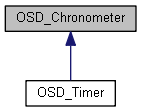This class measures CPU time (both user and system) consumed by current process or thread. The chronometer can be started and stopped multiple times, and measures cumulative time.
More...
#include <OSD_Chronometer.hxx>
|
| static void | GetProcessCPU (Standard_Real &UserSeconds, Standard_Real &SystemSeconds) |
| | Returns CPU time (user and system) consumed by the current process since its start, in seconds. The actual precision of the measurement depends on granularity provided by the system, and is platform-specific. More...
|
| |
| static void | GetThreadCPU (Standard_Real &UserSeconds, Standard_Real &SystemSeconds) |
| | Returns CPU time (user and system) consumed by the current thread since its start. Note that this measurement is platform-specific, as threads are implemented and managed differently on different platforms and CPUs. More...
|
| |
This class measures CPU time (both user and system) consumed by current process or thread. The chronometer can be started and stopped multiple times, and measures cumulative time.
If only the thread is measured, calls to Stop() and Show() must occur from the same thread where Start() was called (unless chronometer is stopped); otherwise measurement will yield false values.
◆ OSD_Chronometer()
Initializes a stopped Chronometer.
If ThisThreadOnly is True, measured CPU time will account time of the current thread only; otherwise CPU of the process (all threads, and completed children) is measured.
◆ ~OSD_Chronometer()
| virtual OSD_Chronometer::~OSD_Chronometer |
( |
| ) |
|
|
virtual |
◆ GetProcessCPU()
Returns CPU time (user and system) consumed by the current process since its start, in seconds. The actual precision of the measurement depends on granularity provided by the system, and is platform-specific.
◆ GetThreadCPU()
Returns CPU time (user and system) consumed by the current thread since its start. Note that this measurement is platform-specific, as threads are implemented and managed differently on different platforms and CPUs.
◆ IsStarted()
Return true if timer has been started.
◆ Reset()
| virtual void OSD_Chronometer::Reset |
( |
| ) |
|
|
virtual |
Stops and Reinitializes the Chronometer.
Reimplemented in OSD_Timer.
◆ Restart()
| virtual void OSD_Chronometer::Restart |
( |
| ) |
|
|
virtual |
Restarts the Chronometer.
Reimplemented in OSD_Timer.
◆ Show() [1/4]
| virtual void OSD_Chronometer::Show |
( |
| ) |
const |
|
virtual |
Shows the current CPU user and system time on the standard output stream <cout>. The chronometer can be running (laps Time) or stopped.
Reimplemented in OSD_Timer.
◆ Show() [2/4]
Shows the current CPU user and system time on the output stream <os>. The chronometer can be running (laps Time) or stopped.
Reimplemented in OSD_Timer.
◆ Show() [3/4]
| void OSD_Chronometer::Show |
( |
Standard_Real & |
theUserSeconds | ) |
const |
Returns the current CPU user time in a variable. The chronometer can be running (laps Time) or stopped.
◆ Show() [4/4]
Returns the current CPU user and system time in variables. The chronometer can be running (laps Time) or stopped.
◆ Start()
| virtual void OSD_Chronometer::Start |
( |
| ) |
|
|
virtual |
Starts (after Create or Reset) or restarts (after Stop) the chronometer.
Reimplemented in OSD_Timer.
◆ Stop()
| virtual void OSD_Chronometer::Stop |
( |
| ) |
|
|
virtual |
Stops the Chronometer.
Reimplemented in OSD_Timer.
◆ Stopped
The documentation for this class was generated from the following file:

 1.8.13
1.8.13